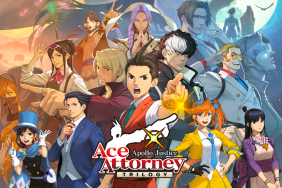With the launch of The Witcher 3: Wild Hunt, the Daily Reaction crew talks about it means for a game to tell an engrossing story. With the differences between a dynamic story and a static one being usually up to the amount of endings a game has, a question is raised about which is the best approach.
Dan: I honestly think that both types of storytelling have their ups and their downs, but I do believe that dynamic stories have the most potential. I say this simply because, as we have been seeing different ways to let the player interact with a game, we are now starting to see different ways for developers to interact with their audience, and that has been leading us to some interesting takes on what it means to tell a story.
Looking back at games like Zork, where players had to enter in text commands to try and find the appropriate path to take, we can see some of the early levels of storytelling. While the story itself wasn’t something amazing by current standards, the ability for a player to use their own language to interact with a world is a great way to let players tell their own story in a dynamic way. This type of idea has evolved into what we see now with just about any game with a narrative, as the player can decide the order of certain events and what they do in some locations by controlling an avatar, but these are only ever stop gaps between a static tale that we all see unfold in the same way.
Now, we have games like The Witcher 3: Wild Hunt which is building upon the decisions from the previous titles that adapts the world around you into what has happened in the past. These types of stories, while still limited on a number of levels are our most modern ways of letting players take control of their world outside of deciding what to do with their character, or which room to go into first. They are letting us start to craft our own protagonists into who we want them to be, or even a reflection of who we are as people.
None of this is to say that I think static stories are archaic or lack the same impact as a dynamic tale, but I do think the level of personification is more difficult when your decisions are forced upon you. Some stories do not have any issues with this, as they do not rely on the player’s ability to empathise, but I do think this can limit the ability to have impactful moments. For example, if a character’s love interest dies, but you have no investment in the characters, and you don’t have any say in how the events unfolded, it would be difficult to feel any remorse, or responsibility as the events were far outside of your control.
The biggest benefit for a static story, while not always its ability to connect the player in an easy manner, is its ability to establish permanence and absolution of its story arc. Many players have stated that they will replay certain events, or even revert back to a save simply to redo an outcome they didn’t like. But, with a static story, the events unfold and when a beloved character dies or does something unwanted, there isn’t the ability to turn back, and I think that is able to stick with fans on a grander scale than something with multiple branches. This is especially true when you try to talk about some of the more memorable moments in gaming history, it doesn’t mean we haven’t had to make some difficult decisions in the past with Megaton ramifications, but they are few and far between.

Chandler: Just wait until you find yourself further into The Witcher 3, Dan. The way that your decisions across the game have consequences that seep into other missions is staggering, up to a point where a surprising event can occur based on a decision I had made hours and hours earlier in a seemingly unrelated side mission. The developers were smart. There was no reloading a save to go back on a consequence that I wasn’t happy with. The seeds for this event were sown before I had any idea of what kind of hangman’s tree they could grow into.
This nature of weaving together the stories dynamically means that I can have a radically different experience with The Witcher 3 than anybody else playing it, crafted entirely by my own choices and their consequences. Do I want to be kind hearted Geralt, shirking reward for simply doing good deeds? Do I want to actively pursue payment for my work? Do I want to be a complete dick? I can do any and all of these things, and unlike other games that use a strict karma system, the ambiguity of the decisions doesn’t make it immediately apparent what the “right” and “wrong” choices are.
We’ve seen other games allow us to dynamically craft certain elements, such as Telltale Games titles that really allow players to become the character and define who they want their player character to be, even if the overall narrative generally course corrects and stays that same. It was one of the aspects that I loved most about The Wolf Among Us. I was able to make my Bigby Wolf uniquely my own.
As you said though, this level of choice is not always for the best, and some stories need to be static, while still allowing us to empathize with our characters through interactivity. We talked about it a mere few weeks ago in Daily Reaction, in fact, and the “Press X to pay respects” option in Advanced Warfare was brought up. It’s not a choice. You can’t decided whether Jack Mitchell pays his respects to his dead friend or not (unless you simply turn off the game and never continue past that point). Games don’t need to offer dynamic choice to make players feel immersed or involved, and each developer needs to figure out what fits best for the story that they are trying to tell.
There is always the concern in dynamic games of the huge number of story threads being affected by allowing dynamic choice. Telltale titles will often fix this through methods of course correction, ensuring that certain major story events take place regardless of your choices, but with something as massive as The Witcher 3 offering a multitude of endings and branching paths affected by seemingly inert decisions, it will be interesting to see how dynamic games evolve in the future to keep up and offer players both a well written and cohesive story, while still making player choice a central component.
Do you prefer a static story? Or dynamic one? Let us know in the comments below, email us at DailyReaction@PlayStationLifeStyle.net or watch us make decisions on Twitter @Foolsjoker and @Finchstrife.
For more interesting Daily Reaction articles, click here.








